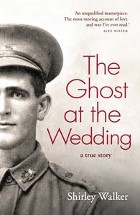The ghost at the wedding; a true story by Shirley Walker

Penguin, 2010. ISBN 9780143203292. Louis Braille Audio Book read by
Kate Hood.
With an intriguing title, The Ghost at the wedding, sets out to tell
a personal story of love and family, during the tumultuous period
from 1914 to 1945. It considers both the men who went to war and the
women who coped with everything life threw at them. The narrative
joins a current flock of fictionalised accounts of real people's
lives, attributing to actions and emotions which can be surmised
rather than known. This new tradition of biography allows authors to
blend historical detail, anecdote and personal memories into a
narrative which is not only accessible to a wide readership but also
creates a deep understanding of personal experiences of a specific
time in history.
This fascinating story illuminates pioneer life in the cane fields
of northern New South Wales, the battlefields of Gallipoli, the
trenches of France and the struggles of the Kokoda Track. She
poignantly describes a series of lives torn apart and melded through
the struggles of war. At times, the narrator slips into historian
during the narrative, which does jar with the reader but it also
lends an unique authenticity to the historical claims of the text.
Shirley Walker is telling her family story, but the vast amount of
research she has done and the documents she has been able to unearth
will leave other genealogists green with envy. She has been able to
paint an authentic picture of all the periods and places she
describes.
While the title, The ghost at the wedding, describes a particular
period in the family's life, in a sense it could also be seen as the
proverbial 'elephant in the room' which underpins the whole story -
namely, war and its effects on individuals and family. Such
difficult topics could be harrowing and while Shirley Walker does
not shy from them, neither does she revel in gory details. Each
person's story and situation is treated remarkably sensitively, as
one might expect from a personal history rather than a racy
blockbuster. Shirley Walker is able to bring many skills from her
long career in Australian literature to bear in this important piece
of social history.
In the tradition of the excellence for which Louis Braille books
have come to be known, Kate Hood reads this narrative with clarity
and sensitivity. She brings warmth and honesty to this remarkable
story.
Diana Warwick